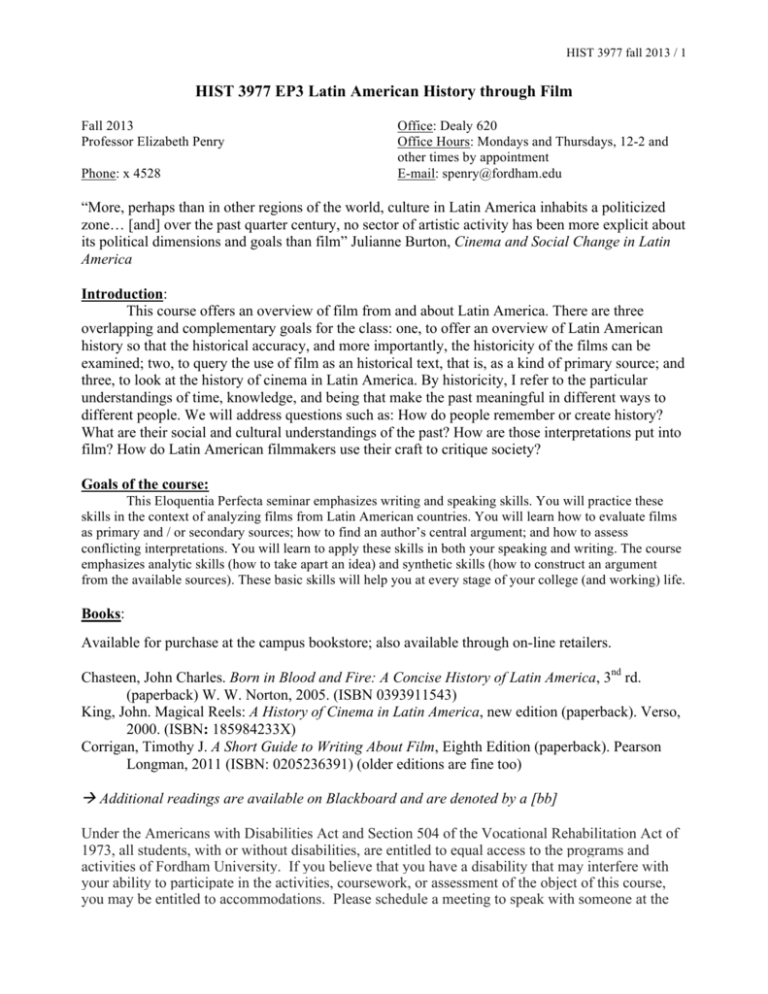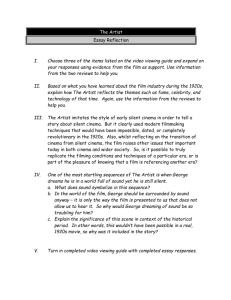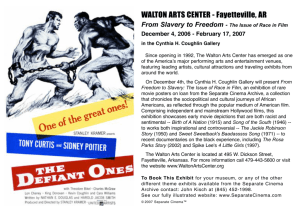
HIST 3977 fall 2013 / 1
HIST 3977 EP3 Latin American History through Film
Fall 2013
Professor Elizabeth Penry
Phone: x 4528
Office: Dealy 620
Office Hours: Mondays and Thursdays, 12-2 and
other times by appointment
E-mail: spenry@fordham.edu
“More, perhaps than in other regions of the world, culture in Latin America inhabits a politicized
zone… [and] over the past quarter century, no sector of artistic activity has been more explicit about
its political dimensions and goals than film” Julianne Burton, Cinema and Social Change in Latin
America
Introduction:
This course offers an overview of film from and about Latin America. There are three
overlapping and complementary goals for the class: one, to offer an overview of Latin American
history so that the historical accuracy, and more importantly, the historicity of the films can be
examined; two, to query the use of film as an historical text, that is, as a kind of primary source; and
three, to look at the history of cinema in Latin America. By historicity, I refer to the particular
understandings of time, knowledge, and being that make the past meaningful in different ways to
different people. We will address questions such as: How do people remember or create history?
What are their social and cultural understandings of the past? How are those interpretations put into
film? How do Latin American filmmakers use their craft to critique society?
Goals of the course:
This Eloquentia Perfecta seminar emphasizes writing and speaking skills. You will practice these
skills in the context of analyzing films from Latin American countries. You will learn how to evaluate films
as primary and / or secondary sources; how to find an author’s central argument; and how to assess
conflicting interpretations. You will learn to apply these skills in both your speaking and writing. The course
emphasizes analytic skills (how to take apart an idea) and synthetic skills (how to construct an argument
from the available sources). These basic skills will help you at every stage of your college (and working) life.
Books:
Available for purchase at the campus bookstore; also available through on-line retailers.
Chasteen, John Charles. Born in Blood and Fire: A Concise History of Latin America, 3nd rd.
(paperback) W. W. Norton, 2005. (ISBN 0393911543)
King, John. Magical Reels: A History of Cinema in Latin America, new edition (paperback). Verso,
2000. (ISBN: 185984233X)
Corrigan, Timothy J. A Short Guide to Writing About Film, Eighth Edition (paperback). Pearson
Longman, 2011 (ISBN: 0205236391) (older editions are fine too)
Additional readings are available on Blackboard and are denoted by a [bb]
Under the Americans with Disabilities Act and Section 504 of the Vocational Rehabilitation Act of
1973, all students, with or without disabilities, are entitled to equal access to the programs and
activities of Fordham University. If you believe that you have a disability that may interfere with
your ability to participate in the activities, coursework, or assessment of the object of this course,
you may be entitled to accommodations. Please schedule a meeting to speak with someone at the
HIST 3977 fall 2013 / 2
Office of Disability Services (Rose Hill - O’Hare Hall, Lower Level, x0655 or at Lincoln Center –
Room 207, x6282).
Classroom Etiquette:
Please arrive on time. Please do not leave class once it begins. Please do not eat or drink during class. No
electronic devices are allowed in class, including cell phones, ipods, ipads, and laptops. Turn you cell phone
off and put it completely away during class. In short, please do no do anything that would interrupt the class
in any way.
Attendance policy:
On-time attendance is expected. Any unexcused absence will lower your grade. According to the
FCRH Undergraduate Bulletin, “Absences for reasons of religious holiday, serious illness, death in
the student’s immediate family, or required participation in a university-sponsored event are, with
the appropriate documentation, excused absences …. The maximum number of total excused
absences will not exceed … four class meetings for a course meeting two days per week.”
Grading:
Participation: A successful class depends on everyone’s participation. Everyone must complete all
the readings for each class, and watch the film before class so that you can join in the discussion.
Participation will count for 30% of your final grade. For an ‘A’ you should have at a minimum two
solid analytical and critical comments per class that demonstrate that you read / watched the
material closely. For a ‘B’ you should have at a minimum two solid comments per class that
demonstrate familiarity with the material. For a ‘C’ you should comment at least once per class.
Print out the readings for each day so that you may refer to them in your comments.
Film Introduction and Discussion: The class will be divided into 6 groups and each group will
present on two films during the semester. The presentation will include introducing the film and
leading discussion for that day. This will require a careful pre-screening of the film to select 3-4 key
scenes (approx 15 minutes total, depending on the film) to replay for the class to watch together.
Please see the handout on group projects for more details. The group project is worth 30% of your
final grade.
Research paper: 15 pages, 11 or 12- point type, double-spaced, normal margins. The paper will
count as 40 % of the final grade. Please see the handout on the research paper for more details.
Please note that the paper will be written in stages and that each stage must be completed by the due
date to earn full credit for the paper.
Film and Reading Schedule
DATE Week 1 Thurs, Aug 29 TOPIC Introduction to course READING NO CLASS MONDAY SEPTEMBER 2, Labor Day holiday Wednesday, September 4 follows a Monday schedule Wed, Sep 4 How do we talk about film? Corrigan, chapters 1-­‐4, Rosenstone and Parvulescu, “Introduction” from A Companion to the Historical Film [bb] HIST 3977 fall 2013 / 3
Thurs, Sept 5 Mon, Sept 9 Chasteen, intro & ch 1; Conquest and National Identity La Otra Conquista (Mexico, 1999, 105 Carrasco, Salvador, “The Invisible Sight” in The min) Zapatista Reader, ed. Tom Hayden. New York, 2002 [bb]; Chorba, Carrie, “Exploring Mexican national identity in Salvador Carrasco’s film, La Otra Conquista” in Review: Literature and Arts of the Americas, 37:2, 221-­‐231.[bb] Thurs, Sept 12 Slavery and Cuban Identity Chasteen, ch 2; Davis, Natalie Slaves on Screen: Film and Historical Vision, Harvard Univ Press, 2002, ch 1 & 3 [bb]; King, ch 7 Mon, Sept 16 La Ultima Cena (Cuba, 1976, 120 min) Mraz, John “Recasting Cuban Slavery” in Based on a True Story, ed. Donald Stevens, SR Books, 1997. [bb]; Jaehne, Karen, review of The Last Supper in Film Quarterly, vol. 33, no. 1 (Autumn 1979), pp. 48-­‐53. [bb] Thurs, Sept 19 Liberalism and the expansion of the Chasteen, ch 5 & 6; Platt, Tristan. “Liberalism Hacendado Class and Ethnocide in the Southern Andes,” History Workshop, 17 (1984: Spring). [bb] Mon, Sept 23 Julio comienza en Julio (Chile, 1977, King, ch 8 120 min) Thurs, Sept 26 The Mexican Revolution Chasteen, ch 7; King, ch 1 & 2 Mon, Sept 30
¡Vamonos con Pancho Villa! (Mexico, Mraz, John. “How Real is Reel?” in Framing 1936, 92 min) Latin American Cinema [bb]; Katz, Friedrich. The Life and Times of Pancho Villa, p. 625-­‐633; 790-­‐794. [bb] Thurs, Oct 3 Institutionalized Corruption Lomnitz, Claudio. “Ritual, Rumor and Corruption in the Formation of Mexican Polities.” In Deep Mexico, Silent Mexico. [bb] Mon, Oct 7 La ley de Herodes (Mexico, 1999, 120 King, ch 6; Tegel, Simeon. “Mexican Pols min) Fought ‘Law’ and the Law Won.” Variety, December 13-­‐19, 1999. [bb]; García Tsao, Leonardo. Review: “La ley de Herodes.” Variety, January 3-­‐9, 2000. [bb]; Ruiz, Bernardo. “Bucking the System: La ley de Herodes.” The Independent. May 2000. [bb] Thurs, Oct 10 United States Intervention in Latin Chasteen, ch 8; King, ch 11 America HIST 3977 fall 2013 / 4
NO CLASS MONDAY October 14 Columbus Day Holiday Thurs, Oct 17 El silencio de Neto (Guatemala, 1994, 106 min) Mon, Oct 21 The New Latin American Cinema: Chile Thurs, Oct 24 El chacal de Nahueltoro (Chile, 1969, 95 min) Mon, Oct 28 Dealing with Domestic Terrorism: Peru’s Shining Path Thurs, Oct 31 La Boca del Lobo (1988, Peru, 128 min) Mon, Nov 4 Class conflict and Chile’s Dirty War Thurs, Nov 7 Machuca (Chile, 2004, 121 min) Arévalo, Juan José. Excerpts from “The Shark and the Sardines” in Problems in Modern Latin American History [bb]; Links to The National Security Archive for declassified intelligence materials related to overthrow of Guatemalan government; Seminet, “A Child’s Voice, A Country’s Silence: Ethnicity, Class and Gender in El Silencia de Neto” in Rocha & Seminet, Representing History, Class and Gender in Spain and Latin America King, ch 3; Solanas, Fernando & Octavio Getino. “Towards a Third Cinema: Notes and Experiences for the Development of a Cinema of Liberation in the Third World” [bb]; García Espinosa, Julio. “For an Imperfect Cinema” [bb]; Rocha, Glauber. “An Esthetic of Hunger” [bb] “Popular Unity Program” [Allende’s 1970 platform] in Salvador Allende Reader [bb]; “Film Makers and the Popular Government Political Manifesto” in Chilean Cinema [bb]; “Interview with Miguel Littin” in Chilean Cinema [bb]; “Reports from Variety” in Chilean Cinema [bb] King, ch 9; Vargas Llosa, “Inquest in the Andes” New York Times Magazine (July 31, 1983); Enrique Mayer, “Peru in Deep Trouble: Mario Vargas Llosa’s ‘Inquest in the Andes’ Reexamined in Rereading Cultural Anthropology. George Marcas, ed, pp. 181-­‐219 La Boca del Lobo from The Cinema of Latin America [bb]; Peruvian Truth and Reconciliation Commission: http://www.cverdad.org.pe/ Chasteen, ch 9 Sorensen, Kristin, “The Machuca Phenomenon” from Media, Memory, and Human Rights in Chile, Palgrave 2009; Class conflict, state of exception and radical justice in Machuca, Travesia: Journal of Latin Am HIST 3977 fall 2013 / 5
Mon, Nov 11 Thurs, Nov 14 Mon, Nov 18 Thurs, Nov 21 Mon, Nov 25 Children of the Disappeared from Argentina’s Dirty War Cautiva (Argentina, 2003, 115 min) Neo-­‐liberalism and Immigration within Latin America Bolivia (Argentina 2002, 75 min) The Second Globalization: Water Wars Cultural Studies, 2007; Foster, David Willam, review of Machuca in Chasqui, vol 34, No. 1 (May 2005) King, Ch 4; and other tba Penchaszadeh, Victor, “Abduction of Children of Political Dissidents in Argentina and the Role of Human Genetics in Their Restitution” in Journal of Public Health Policy, Vol. 12, No. 3 (Autumn, 1993), pp 291-­‐305. Chasteen, Ch 10; Rockefeller, Starting from Quirpini, ch 7 [bb] De Carli, Guillermo, “Sliding into Crisis” Vertigo, V.2, N. 4 (April 2003) [bb] Finnegan, “Leasing the Rain” [bb] and tba HAPPY THANKSGIVING! Mon, Dec 2 Thurs, Dec 5 Wed, Dec 11 9:30 am Tambien la Lluvia (Spain, Mexico 2010, 103 min) No class, I will be away at a conference Final Paper due Dawson, Thomas “On the Side of the Angels,” Sight and Sound 22.6 (June 2012); Delgado, Maria, “Even the Rain,” Sight and Sound 22.6 (June 2012) [bb]








